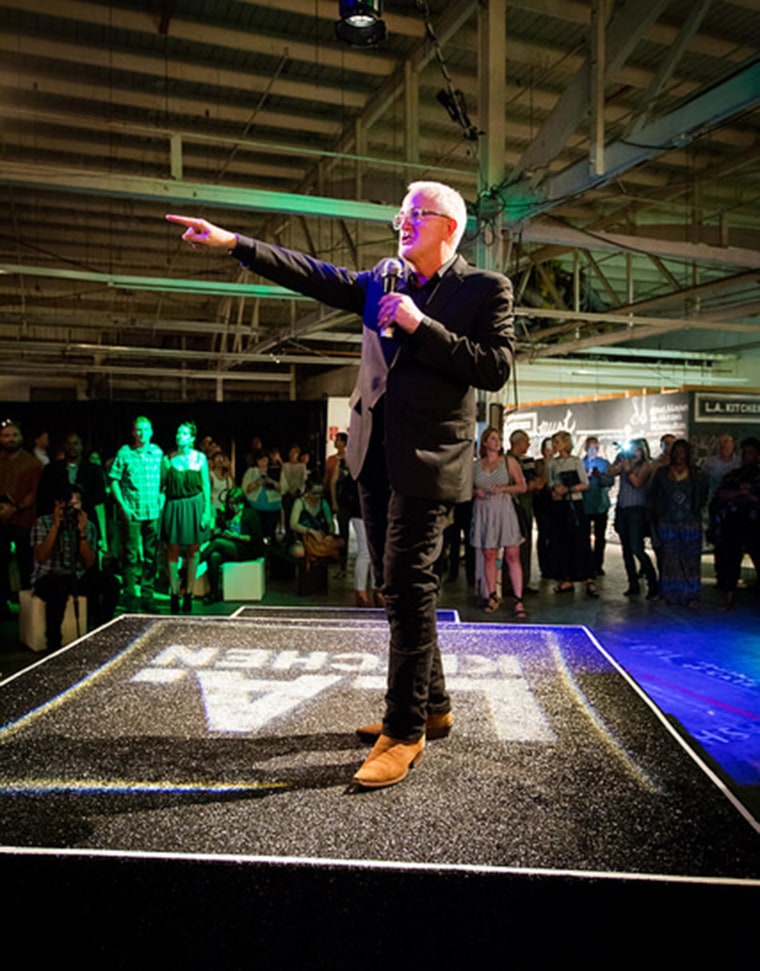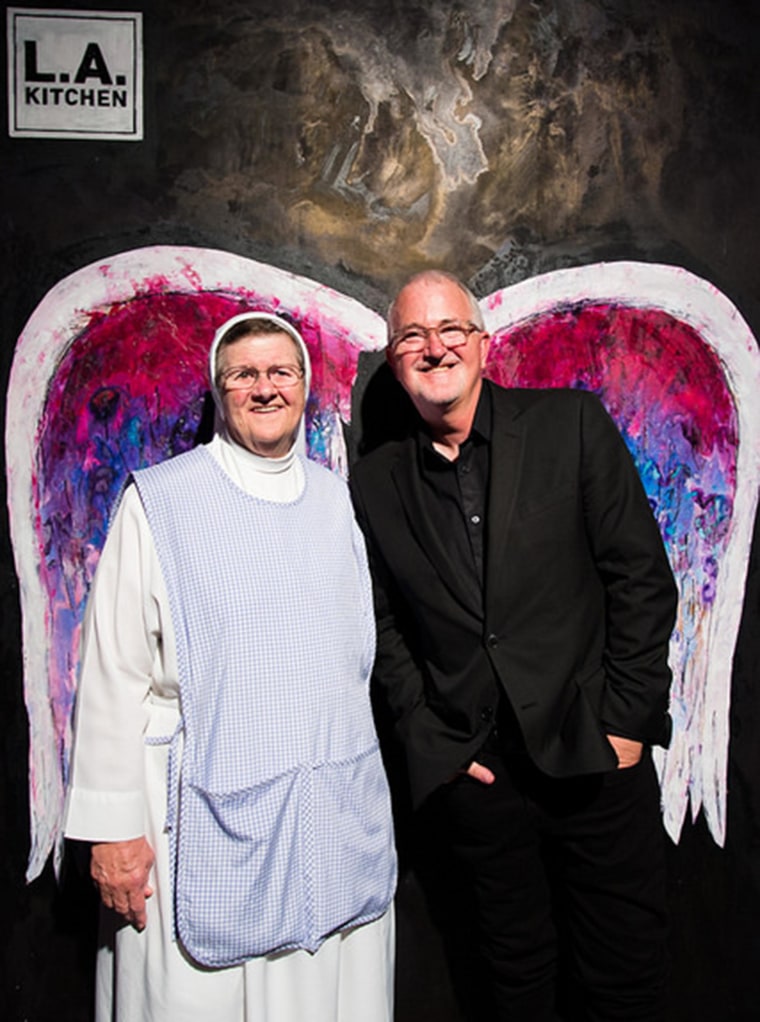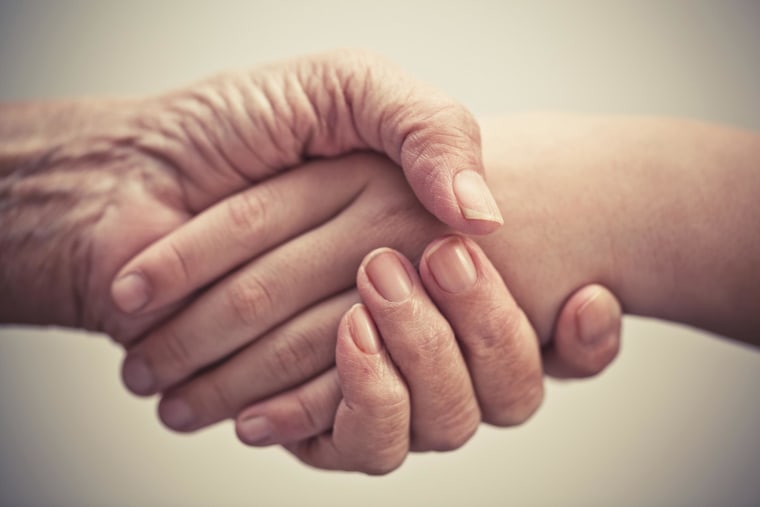
Los Angeles is a city of outsized ambitions, big dreamers and big thinkers, so it makes sense that a social entrepreneur with a 25-year success story already under his belt, would look west to take on what may prove his greatest challenge yet: creating a strategy to feed and empower America’s aging population which, with the impending retirement of boomers, is set to explode.
The man is Robert Egger, the brains behind the DC Central Kitchen, the enterprise he launched in 1989 with food donated from the inauguration of of George H. W. Bush. His work at DC Kitchen established a new model for tackling hunger and need, one rooted in resourcefulness and innovation.
“It’s not enough just to feed somebody,” says Egger. “You have to set them on the path towards liberation and independence. That’s very much where I came from: this sense of empowerment.”
Now in Los Angeles, Egger is busy crafting his new initiative, LA Kitchen, and with the help of the AARP’s first ever one million dollar grant, he’s about to take the model he honed in the nation’s capital to the next level.
LA Kitchen will live inside a vast, brand new 56,000 square foot space currently under construction in LA’s Lincoln Heights, a facility which will also house LA Prep, a separate entity that will be a food production business incubator.
LA Kitchen’s approach will be multi-pronged: tackling food waste by recovering or purchasing millions of pounds of produce; combating unemployment with food training programs for emancipated foster youth and older adults transitioning out of incarceration; and producing and distributing healthy food to social service agencies that serve Los Angeles’ most vulnerable populations. Its for-profit arm, called Strong Food, is aiming to become the leading nutrition provider for seniors in LA over the next 10 to 20 years, and will provide employment for training program graduates with retirement security through profit sharing.
“This generation coming up represents the deepest well of life experience in the history of the planet,” says Egger. “Right now, workers between age 45 and 60 in America, half do not have $10,000 for retirement. So, what we’re anticipating is a significant, I mean we’re talking epic, uptick in the number of people who will need nutrition support, because they’re going to live ten years longer than they have money in the bank.”
Here, Egger discusses his bold plans to reinvent senior meals, explains why food is such a powerful engine for change, and reveals how he fulfilled a teenage dream by living a life of service.
Food is a huge part of LA's identity, but what makes the city such a rich prospect for a project like this?
Well, it sits at the bottom of the funnel that is the central valley of California which is probably one of the greatest wonders of the world when you really get down to it. I mean, it’s a wild nexus of refrigeration, irrigation, transportation, and immigration that after World War II created this bonanza. For the the first time in the history of the world, someone in the dead of winter in Montana could get a tomato or a lemon or a lime. We take that stuff for granted now, but in 1946 that was a miracle. LA produces this abundant surplus, and I trade in what’s available, what’s here, and what we throw away. I knew that by moving to LA, I could access for literally next to nothing, or for a very low price, an unlimited supply of not just fruits and vegetables, but the best fruits and vegetables you can get.
But LA is also home to the largest concentration of older people living in poverty. The oldest baby boomer is only 67, so this is really ground zero in America for this new age of experimentation and how we value our elders.
I like to reveal the power of what’s already here. I like to take things that our society undervalues and show how valuable they truly are.
I like to reveal the power of what’s already here. I like to take things that our society undervalues and show how valuable they truly are. So, while I’m excited about being able to transform food that we throw away into healthy meals, I’m more interested in exposing the power that individuals have, whether they’re someone home from prison, someone who’s an addict, someone off the street, or frankly someone who is just older who has a role they can still play.
In line with that, LA Kitchen will be focused on food recovery but also unemployment. Can you talk about the training programs you have planned?
I like to train whoever’s at the bottom, and so the two groups that are right now the most susceptible to a rough road, are young men and women aging out of foster care, who statistically are on the way to prison or the streets, or older men and women coming home from prison for whom there’s no work. I mean if you’re over 50 and you’re a felon, good luck.
We’re developing what I think will be one of the very first examples of intergenerational, peer mentoring, job training programs, so in effect young and old together purposely.
So, first and foremost, we’re developing what I think will be one of the very first examples of intergenerational, peer mentoring, job training programs, so in effect young and old together purposely. What I want to see happen is an older man or woman look to a younger person and say, “I look at you and I see myself 25 years ago. And I’m not going to let you make the same mistakes that I made. I just came home after 25 years away. I don’t want to see you go down that road.” And I’d like to see young people help older men and women to reacclimate. But together during this 15-week job training program, they’ll be working alongside volunteers and staff to produce thousands and thousands of healthy meals every day.
Construction for LA KItchen has begun, but in the meantime there’s a pilot program already underway. Can you tell us about that?
It’s 15 weeks and it’s an abbreviated class -- our normal class when we open will be 25 men and women per class, but this time I think we’re going to go somewhere around 12 to 15. It will be held at St. Vincent Meals on Wheels, they’re one of our big partners in LA, so we’re using their kitchen for the next few months while we’re building. We’ll do two cycles of those, and it will also help us develop our future staff for the LA Kitchen and Strong Food.

But we’ll also be doing food recovery and we’ll be preparing meals to support partners. One of our goals is to relieve St. Vincent of the need to buy fruits and vegetables that are frozen and just come in a big semi. We want to give them what everybody wants: healthy, local, fresh cut fruits and vegetables. This is going to be one of our big benchmarks: whether it’s free through LA Kitchen, or for a market price through Strong Food, our big goal is to finally make fresh fruits and vegetables available to all the different charities or businesses around Los Angeles that want them. This isn’t just charities, because LA as a city has a good food purchasing policy, which says any LA commission or department that spends over $10,000 on food, needs to make a concerted effort to buy local. So, we’re marching right into that vacuum. We want that business.
Finally, a big part of the next two months is that we’re going to be developing our menus for what we hope will be a very new era in senior meals.
LA’s senior population is going to be huge but also exceptionally diverse -- how are you going to meet the demands of an aging population that will be both ethnically diverse but also selective with vegans, the gluten intolerant and so on?
LA has 1.1 million people over 65 and that number is going to double in the next 15 to 20 years. Right now, less than 10% of income eligible seniors in America use Meals on Wheels or SNAP, food stamps. Right now, workers between age 45 and 60 in America, half do not have $10,000 for retirement. So, what we’re anticipating is a significant, I mean we’re talking epic, uptick in the number of people who will need nutrition support, because they’re going to live ten years longer than they have money in the bank. You can see this coming. So rather than wait we’re trying to get really ahead of this curve and create a system that can create those meals but at the same time anticipate that you’re going to have an army of people who will be much more health conscious, that won’t just eat whatever’s brought to them.
You’re going to have an army of people who will be much more health conscious, that won’t just eat whatever’s brought to them.
So, that’s the glory of what we’re about to go into because there really hasn’t been an effort to date to move beyond what is known in the business as the American menu. You know, if you look around most Meals on Wheels in America, they base their contract and their meal plans on that system, which beyond the obvious kind of traditional menu items, it still features what I believe is the unsustainable and unhealthy meat at the center of the plate concept.
We want to move away from the five compartment kind of institutional thing and go into a six compartment bento box model that will distribute the protein and the starch and the vegetables evenly throughout the plate versus the kind of segmented way of here’s the meat, here’s the starch, here’s the vegetable and here’s desert. This is where we’ll really be able to explore the ethnic richness of Los Angeles.
But we would also like to do what the food trucks are doing, which is to blend and marry certain nationalities, so let’s put together Ethiopian and Mexican, let’s do Peruvian and Chinese, let’s really start to experiment.
Why is food such a powerful engine for change, particularly in a city like LA?
I’m a big believer that there’s a deeper hunger in America. I show how food can feed the body but also the spirit. So, whether it’s the body of an individual or the spirit of a city or a culture, that’s what I’m interested in. You know, the interest we have in farmer’s markets and food, in my opinion, it’s not really about food, it’s that people are hungry for community, they want to be part of something again, they want to join.
There’s an enthusiasm for what we’re doing. I think because it’s entrepreneurial, exciting, it’s innovative.
And that’s what I think a lot of people miss in their understandable hurry to get somebody to write them a check. It’s like money’s fine, man, but what people are looking for is meaning, people want to belong. And so that’s what I think the LA Kitchen has already touched on. There’s an enthusiasm for what we’re doing. I think because it’s entrepreneurial, exciting, it’s innovative. But I think when people really come down and visit us and get a sense of what we’re doing, that’s what I’m going to say, LA is rich, it’s rich beyond measure, and it isn’t in the check book or the money you have, it’s in community, we’re just going to show you how to cash that check.
Who do you credit for bringing you to a life of service?
Wow. There was a man I wanted to be when I was a teenager, and I’ve worked really hard to stay true to that dream. I don’t want to act young or dress young, but I want to stay true to that sense of the man I wanted to be when I grew up. When I was a young, I looked out and I saw Robert Kennedy and Dr. King, Malcom X, these people that I admired. I’m a sinner, I’m no saint, but if anything it’s given me a sense of I’ve been able to stick to that dream I had when I was a kid of the man I wanted to be when I grew up.
This interview has been edited.
For more inspiration and information visit MariaShriver.com
